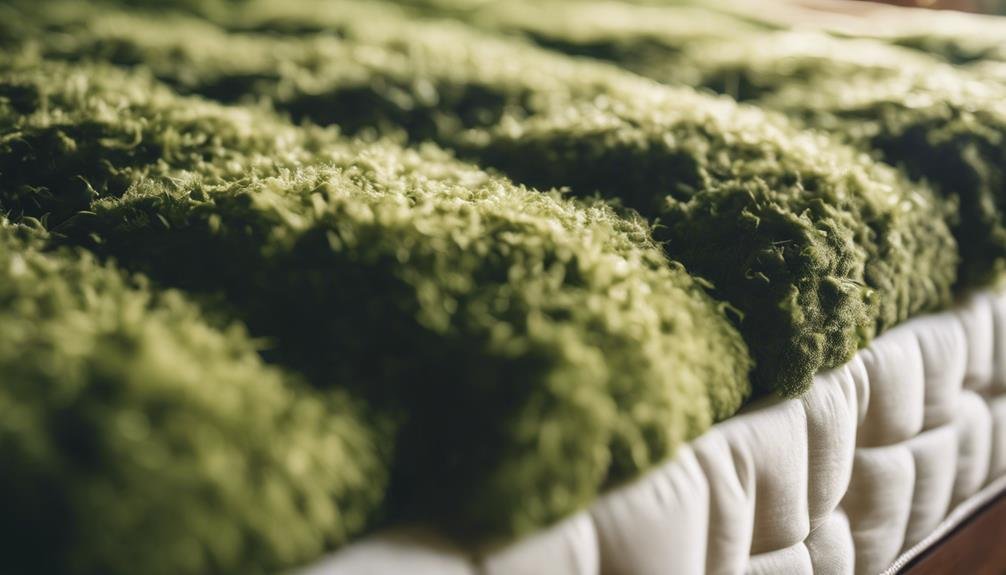When you're on the hunt for an eco-friendly mattress, it can be overwhelming to sift through all the options. You know that making a sustainable choice is important, but where do you start? First, consider natural latex, which is both biodegradable and hypoallergenic. But that's just the beginning. You'll also want to look for specific certifications to verify your mattress is free from harmful chemicals. Avoid synthetic fibers and explore natural flame retardants for a safer night's sleep. Curious about how to make the most ethical choice? Let's break down the key factors.
Key Takeaways
- Opt for natural latex for its durability, biodegradability, and hypoallergenic properties.
- Look for mattresses with GOTS, GOLS, CertiPUR-US, Oeko-Tex, or Made Safe certifications.
- Avoid synthetic fibers and foams that emit harmful VOCs.
- Prioritize fair-trade materials to support ethical practices and fair wages.
- Choose unique materials like organic cotton, wool, kapok, or hemp for their sustainability and breathability.
Prioritize Natural Latex
When choosing an eco-friendly mattress, prioritize natural latex for its sustainable and health benefits. Natural latex, derived from rubber trees, is a fantastic eco-friendly choice. It's organic and biodegradable, making it an excellent option for anyone committed to a sustainable lifestyle. You'll appreciate its non-toxic nature, as it's free from harmful chemicals, ensuring a healthier sleep environment.
One of the standout features of natural latex is its hypoallergenic properties. It's naturally resistant to dust mites, mold, and mildew, providing a cleaner sleeping surface. This is especially beneficial if you suffer from allergies or respiratory issues.
Additionally, natural latex is extremely durable, offering long-lasting comfort and support for many years, which means less frequent replacements and less waste.
You'll also find that natural latex mattresses are highly breathable and temperature-regulating. They promote a cool and comfortable sleep environment, making restless nights a thing of the past.
The environmentally friendly production process of natural latex mattresses further enhances their appeal. By choosing a natural latex mattress, you're making a conscious decision to support sustainable practices and enjoy a multitude of health benefits in return.
Look for Certifications
Certifications are your best ally in making sure that your eco-friendly mattress is genuinely safe and sustainable.
First, look for the Global Organic Textile Standard (GOTS) and the Global Organic Latex Standard (GOLS) certifications. GOTS certification guarantees that the materials used in your mattress, like cotton, are organic and produced sustainably. GOLS certification confirms that the latex used is organic and meets stringent environmental and social criteria.
Don't stop there—make sure your mattress has a CertiPUR-US certification. This third-party certification guarantees that the foam in your mattress is free from harmful chemicals like formaldehyde and phthalates.
Additionally, an Oeko-Tex Standard 100 certification indicates that the mattress has been tested for harmful substances and is safe for use.
For added peace of mind, look for the Made Safe certification. This label assures you that the mattress is free from known toxic chemicals that could harm your health.
Also, the Forest Stewardship Council (FSC) certification is essential if your mattress contains wood. It ensures the wood comes from responsibly managed forests, contributing to global forest conservation efforts.
Avoid Harmful Chemicals

Ensuring your mattress doesn't contain harmful chemicals is just as important as verifying its certifications. Start by choosing a non-toxic mattress made from organic materials like certified organic cotton, organic wool, and natural latex. These materials aren't only eco-friendly but also reduce your exposure to pesticides and carcinogenic chemicals.
Avoid mattresses that contain synthetic fibers or foam, as these can emit volatile organic compounds (VOCs). VOCs are linked to skin irritation and respiratory issues, making them a significant health concern. By selecting mattresses made from certified organic cotton and organic wool, you're ensuring that your sleeping environment is free of harmful chemicals.
Chemical flame retardants are another aspect to examine. Many mattresses use these additives to meet safety standards, but they can be harmful. Opt for mattresses that use natural sources for flame retardancy. Look for third-party certification from organizations like Oeko-Tex and Global Organic Textile Standard (GOTS) to guarantee the absence of harmful chemicals.
Lastly, air out your new mattress in a well-ventilated area before use. This simple step helps minimize fume exposure. By following these tips, you can enjoy a healthier, eco-friendly sleep environment.
Consider Fair-Trade Options
Opting for fair-trade mattress materials guarantees that workers are treated fairly and paid justly. When you choose fair-trade options, you're supporting ethical practices that prioritize workers' well-being. Look for fair-trade certifications on materials like cotton, wool, and latex to make certain that the people involved in the production process operate in safe working conditions and receive fair wages.
Selecting fair-trade materials promotes social justice and sustainability. By doing so, you're contributing to the empowerment of marginalized communities and ensuring that your mattress purchase supports transparent and accountable production processes. This means that every step of manufacturing, from sourcing raw materials to the final product, adheres to high ethical standards.
Moreover, choosing fair-trade options makes you an environmentally conscious consumer. Ethical production methods often incorporate sustainable practices that minimize environmental impact. By focusing on fair-trade, you help create a more equitable industry that values both human and environmental health.
Ultimately, your decision to select fair-trade mattress materials isn't just about comfort; it's about making a positive impact. You're supporting an industry that values ethical practices, social justice, and sustainability, all while safeguarding the well-being of those who produce the materials you sleep on.
Explore Unique Materials

Exploring unique materials for your mattress can lead you to discover sustainable and comfortable options that enhance your sleep quality. One standout material is natural latex, a renewable and biodegradable option known for its durability and antimicrobial properties. It provides excellent support and comfort for eco-friendly mattresses.
Organic cotton is another fantastic choice; it's pesticide-free and offers a soft, breathable sleeping surface. Often paired with natural latex, it creates a harmonious blend of comfort and sustainability.
Wool is widely appreciated for its moisture-wicking, flame-resistant, and antimicrobial characteristics, making it a remarkable addition to your mattress.
For something lighter, consider kapok. This sustainable material is renowned for its softness and temperature-regulating abilities, ensuring a comfortable night's sleep.
Hemp is also a remarkable mention. As a sustainable material, it's breathable, moisture-wicking, and resistant to mold, contributing to a healthier sleeping environment.
Frequently Asked Questions
What Is the Healthiest Material for a Mattress?
When you're looking for the healthiest material for a mattress, consider natural latex. It's non-toxic, antimicrobial, and breathable, making it a top choice for health-conscious individuals.
Organic wool is another excellent option; it's flame-resistant, moisture-wicking, and dust mite resistant.
Organic cotton, while soft and pesticide-free, may flatten over time.
Hemp offers sustainability and breathability, and kapok provides lightweight comfort with good temperature regulation.
How to Buy an Eco-Friendly Mattress?
To buy an eco-friendly mattress, start by looking for organic materials like natural latex, cotton, or wool. Check for certifications such as GOTS or Oeko-Tex to guarantee eco-friendly standards.
Prioritize companies that are transparent about their material sourcing and manufacturing processes. Opt for mattresses with natural flame retardants to avoid harmful chemicals.
While they might be pricier, the long-term health and environmental benefits are worth it.
What Is an Eco Mattress Made Of?
An eco mattress is made of natural materials like organic latex, cotton, wool, hemp, and kapok. These materials are sustainable, renewable, and biodegradable, ensuring a healthier sleep environment.
Organic latex offers comfort and breathability, while wool regulates temperature and has antimicrobial properties.
Hemp is great for moisture-wicking and antimicrobial features.
Though kapok isn't flame-resistant, it's lightweight and helps with temperature regulation.
What Are Eco-Friendly Beds Made Of?
Eco-friendly beds are made of natural materials like organic cotton, wool, hemp, kapok, and natural latex. These materials are sustainable, renewable, and biodegradable, ensuring a lower environmental footprint.
Natural latex offers durability and comfort, while wool provides moisture-wicking and temperature-regulating benefits. Choosing these materials not only promotes healthier sleep but also supports sustainable practices and reduces harmful chemical exposure in your home.
Can I Use These Eco-Friendly Mattress Materials in My Own Home?
Yes, you can use the best ecofriendly mattress materials in your own home. These materials are made from natural and sustainable resources, such as organic cotton, natural latex, and wool. Not only are they better for the environment, but they also provide a healthier and more comfortable sleep experience for you and your family.
Conclusion
Choosing an eco-friendly mattress doesn't have to be complicated. Prioritize natural latex, look for trusted certifications, and avoid harmful chemicals.
Don't forget to contemplate fair-trade options for ethical practices and explore unique materials like organic cotton, wool, kapok, and hemp.
By following these tips, you'll guarantee your mattress is both comfortable and kind to the planet. So, make the switch today and enjoy a healthier, more sustainable sleep environment.

